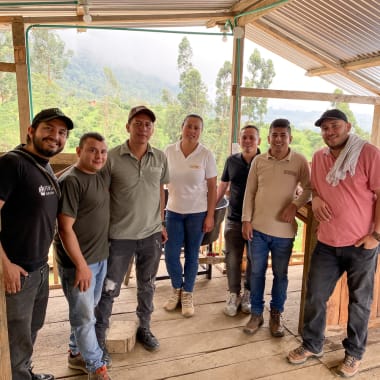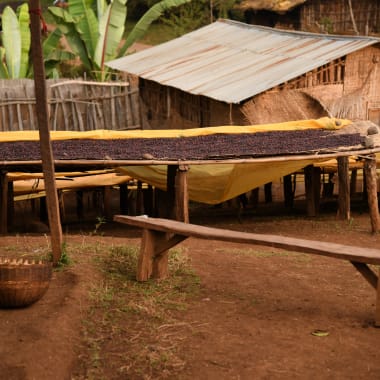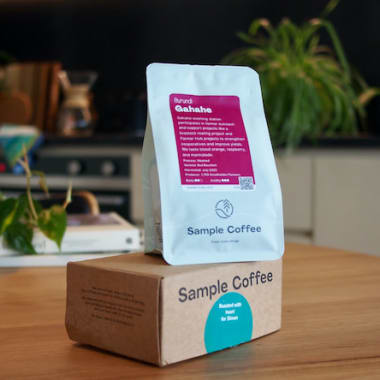
Colombia Adriana Díaz
Sold out
Flavours of lemongrass, black tea, bergamot
Body Acidity
Anaerobic washed Gesha
Roasted omni for filter and espresso
Colombia Adriana Díaz online
Sold out
Flavours of lemongrass, black tea, bergamot
Body Acidity
Anaerobic washed Gesha
Roasted omni for filter and espresso
Colombia Adriana Díaz online
Sold out
Flavours of red apple, frangipane, passionfruit
Body Acidity
Anaerobic washed Caturra
Roasted omni for filter and espresso
Nicaragua Gregorio Roberto Herrera online
Sold out
Flavours of lemongrass, raspberry and milk tea
Body Acidity
Anaerobic washed Bishari
Roasted omni for filter and espresso
Ethiopia Jabanto Producers Anaerobic Washed onlineSold out
Flavours of cranberry, coffee cherry, white peach
Body Acidity
Anaerobic washed Yellow Caturra
Roasted omni for filter and espresso
Ecuador Terrazas Del Pisque Anaerobic Washed online
Sold out
Flavours of white peach, fresh hops, jasmine
Body Acidity
Anaerobic washed Ethiopian Heirloom
Roasted omni for filter and espresso
Ethiopia Jabanto Producers Anaerobic Washed online
No gear? No worries. Make an outstanding cup of coffee anytime, anywhere
Drip and steeped bags
Our beans delivered to your door every 1-5 weeks, with complete flexibility
Subscriptions
Send somone a gift subscription to any of our coffees
Gift vouchers
Shop our range of brewing gear, accessories, merch, and more
Brew gear and accessoriesWe’ve featured over 500 different coffee lots.
Historically, Bolivia has not been as popular as its neighbouring countries in terms of exports, but coffee has been present since the 19th century.
Brasil is the largest coffee-producing nation in the world. It is also known as a country out of which countless new varietals have emerged, both through natural mutations and selective breeding
Coffee first arrived in Burundi in the 1920s while the country was still under Belgian colonial rule. Since the civil war in 1993 Burundi has placed a great importance on growing the coffee industry and the flow on effects that will have on the country’s economy.
Colombia is one of the largest coffee producers in the world and benefits greatly from having one of the most unique and complex set of micro-climates of all coffee producing nations.
Since the mid-2000s there has been an increasing focus on the establishment of micro-mills in Costa Rica to increase their production of traceable, high quality lots of coffee.
For a long time most of Ecuador’s coffee production was for commodity grade export or the production of soluble coffees (freeze dried coffee). Only in the last few years has the potential of the country’s coffee production been really explored. We’re very excited about the potential Ecuador and have some truly exceptional coffees
El Salvador, the smallest country in Central America, is colloquially referred to as the ‘Land of Volcanoes’. Renowned for producing exceptional coffees with great clarity and sweetness. The coffee industry first took off after their primary crop, indigo, declined with the invention of chemical dyes in the 19th Century.
Seen as the birthplace of domesticated coffee, there are not many more exciting times at the Sample warehouse as when our fresh Ethiopian lots arrive. Legend says it’s our favourite origin…
Guatemala’s production of coffee first grew in the 1860s on the back of a declining indigo trade, which had previously existed as it’s main export. Up until 2011 Guatemala was in the top 5 highest producing coffees nations in the world, before being overtaken by Honduras.
The largest producer of coffee in Central America and one of our favourite coffee producing nations, capable of producing fruit driven coffees with a great, vibrant acidity.
We’re still adding details for Indonesia – check back soon
Alongside Ethiopia and Colombia, Kenya is one of the origins we get most excited about at the roastery. It exports some of the most vibrant, bright, and unique coffees in the world.
While Mexico is in the top 10 coffee-producing countries, its most commonly associated with commodity coffee used in lower-grade blends. Thankfully this is changing as more smaller producers show what’s possible with quality-focused picking and processing.
The true potential of Nicaraguan coffee has been hindered by a long history of political instability and natural disaster, however successful programs such as the Cup of Excellence competition and the Nicaraguan Specialty Coffee Association have helped drive the potential of Nicaraguan coffee into real quality production
Panama is one of the most revered coffee origins in the industry. The high altitude farms and perfect weather conditions make for a complex and dynamic cup of coffee.
PNG is a new and exciting country for us – stay tuned for more details
Peru is well suited to coffee cultivation and production, given its high altitude and climate.
Since the genocide of 1994, coffee has come to represent a symbol of recovery and regrowth for Rwanda.